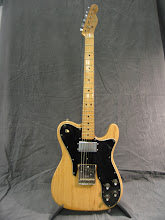 Son Volt
Son VoltAmerican Central Dust
Rounder Records
CD
I never make any excuses or apologies about my affection for Jay Farrar's music. The entire Uncle Tupelo discography, particularly No Depression and Anodyne, and Son Volt's debut album, Trace, are all phenomenal, timeless recordings. Call it Americana, or Alt-Country, or Roots-Rock, or anything you please. Whatever you want to call it, there's one thing you cannot deny: Jay Farrar got in on the ground floor of that shit. Nearly 20 years after Uncle Tupelo's first record, people are still trying to do what Jay was doing.
And in my opinion, nobody has been able to do it half as well.
One big reason for this is Jay's unparalelled vocal stylings. Not only is he a great singer, but he has a defining voice for his genre. He just needs to be singing this kind of music, like Hank Williams needed to be singing Country, Sam Cooke needed to be singing soul, and Muddy Waters needed to be singing the blues. No matter what's coming out of his mouth, the natural desperation in Farrar's voice conjures up imagery of the great depression, the dust bowl, or any rural tragedy you can think of. I sometimes wonder if the reason why Wilco decided to ditch Alt-Country in favor of a more experimental pop sound was because Jeff Tweedy knew he could never do this better than Jay. Obviously, Jeff found his niche, and he's much bigger than Farrar will ever be, but I sometimes wonder. Trace blows A.M. out of the water, and none of the rootsy songs on Being There sound as good as any of the early Son Volt stuff.
Unfortunately, such a blessing can sometimes be a curse. Often times, when you do one thing really well, the tendency can be to get complacent. Why take chances on something new when you have a reliable formula that works, and also makes you decent money? American Central Dust is the third Son Volt release since Farrar reformed the band in 2005. The first two are both solid records. But they both sound like attempts to recreate the magic of Trace. And that isn't necessarily a bad thing, but at least for me it makes me less enthusiastic about both them, because I would really rather just listen to Trace than an attempt to rehash it. I don't want to be overly critical about this; Jay has earned a pass from me for his previous greatness, and the live show is still great, so I don't want to imply that any of this is bad. It's just kind of boring. With its latest release, however, it appears that American Central Dust is a great step forward for Son Volt 2.0.
Instead of attempting a big studio sound, American Central Dust has a stripped down feel that makes perfect sense and accentuates the bands strengths. Jay's voice is the dominant instrument on this album, and that's the way it needs to be. The band is tight and tasteful, and each member does a great job with the space allotted to him. Lead guitarist Chris Masterson has a look straight from Look at this Fucking Hipster!, but he sounds like he was born to play country guitar, and although I never thought I would say this, is a better fit for this band than former Backslider Brad Rice was. Andrew DuPlantis (bass guitar) and Dave Bryson (drums) prove to be a dead-on rhythm section, and Mark Spencer chips in on keyboards, lap steel and pedal steel.
Where it hits:
All over the place. "Dynamite" is the leadoff track, and it's classic Farrar with what sounds like an accordion accompaniment. "Cocaine and Ashes" is a piano-driven ballad that sounds like it's probably written from the perspective of Keith Richards, and it's fantastic. "Dust of Daylight" is so catchy and earthy it may as well have been written by Gram Parsons himself. "Pushed too Far" is a slow number about genuine midwestern desperation that John Mellencamp wishes he could have written, and the closing track, "Jukebox of Steel" sounds just like some of the best country numbers from Uncle Tupelo's later years. The best song on this record is "When the Wheels Don't Move", which is percussive, haunting, and crunchy. Farrar sings lyric about lost jobs and lost hope like nobody else can, while a distorted steel guitar plays along. Somehow it sounds like a cross between folk and shoegazer. I know that probably sounds awful, but believe me, it works like a charm.
Where it misses:
There's only one bad song on this effort. The piano and violin driven "Sultana" recalls the tale of the steamboat disaster of the same name. It's bad. I mean really bad. My advice to Jay is to leave songs about maritime disasters to Gordon Lightfoot.
Overall, this is not only a great sounding effort from Son Volt, but it's one that leaves me optimistic about the band's future. I get the feeling that they can deviate from the norm enough to keep it fresh, while still retaining their best qualities and doing what they do best. Well done, Mr. Farrar.
Son Volt plays the Variety Playhouse next Friday, September 11th. I'm going to go and you should too. Hope to see you there.




No comments:
Post a Comment